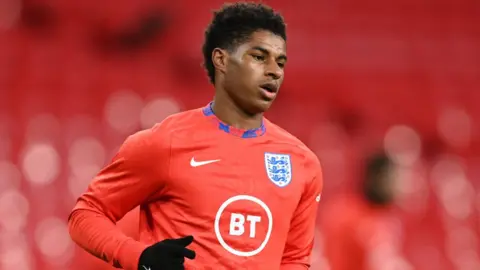Is there really no money for free school meals?

 Reuters
ReutersAmid the talks over Manchester's request for an extra £30m a month for jobs support, or indeed the tens of millions for half-term free school meals in England, and the debate over a tougher lockdown, the government and its top supporters are citing the idea that there is no money left.
Certainly, this morning's public finances showed the government borrowing in the first half of the financial year at a record high, the highest levels of government debt in 60 years and the deficit this year heading for its highest ever level outside of a world war.
This is before the statisticians have accounted for likely losses from tens of billions of government-guaranteed lending to businesses.
September's numbers alone saw a fivefold increase in borrowing, up from £7.7bn last September to £36.1bn, driven by more spending on the furlough scheme, health and self-employment, as well as far less VAT and income taxes received.
The Office for Budget Responsibility (OBR) this afternoon also published a chart showing that of the £262bn that the Treasury has borrowed by issuing gilts, £246bn has been bought by the Bank of England.
The central bank has indirectly created and lent most of the extra money required by the government.
Overall, the government has not had to raise the funds from the private sector or abroad.
So, no, we aren't really running out of cash.
More borrowing
The best evidence for that is that the government will indeed be announcing more borrowed money for some of its schemes in the coming days and weeks.
And there is ample evidence that market demand for government debt is still strong.
For example, the European Union found huge demand this week for its new "social bonds" to help Spain and Italy fund pandemic jobs support.
 Getty Images
Getty ImagesHowever, these Bank of England purchases do, in theory, have to be sold back into the market after the crisis.
With a large stock of debt, the government's finances are now very sensitive to even relatively small rises in the rate at which it borrows.
It seems unlikely right now, but is far from unthinkable over the next several years.
Need to prioritise
The government had already planned to borrow more to invest in infrastructure as part of its "levelling-up agenda".
Much higher levels of spending on health and pensions are already baked in to the spending cake as society ages.
So getting the public finances in shape does matter, as a medium-term priority.
Right now, though, it is difficult to argue that "no money" is the constraint on extending free school meals, or furlough support.
Particularly not on a day when it was confirmed pensions will rise by two percentage points more than inflation, at a time when average earnings are negative.
The cost of that triple lock policy, just as an example, is about £1.5bn in extra state pension costs in the coming year, according to Carl Emmerson of the Institute for Fiscal Studies.
These are political decisions to allocate money where the government feels an obligation to prioritise.
